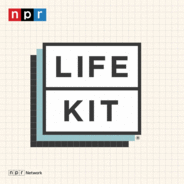Ideas on how to have fun this summer without breaking the bank. Go on a "penny date." Throw a movie marathon party. Swap houses with a friend. With a little imagination, you can bring delight and joy — at a low cost — into your sunny days ahead. This episode originally aired August 1st, 2023.Learn more about sponsor message choices: podcastchoices.com/adchoicesNPR Privacy Policy

RatgeberGesundheit, Wellness & BeautyLeben & Liebe
Life Kit Folgen
Everyone needs a little help being a human. From sleep to saving money to parenting and more, host Marielle Segarra talks to experts to get the best advice out there. Life Kit is here to help you get it together. Want another life hack? Try Life Kit+. You'll support the show and unlock exclusive curated playlists and sponsor-free listening. Learn more at plus.npr.org/lifekit
Folgen von Life Kit
1066 Folgen
-
Folge vom 10.06.2025Budget friendly things to do this summer
-
Folge vom 09.06.2025Easy practices for online privacyIf you're online, your personal data is at risk. It might feel impossible to protect your data from hacks and breaches, but there are methods to make it slow and expensive for bad actors to target you. Our experts share simple measures to better protect your data online, including practices you can pick up starting now.Learn more about sponsor message choices: podcastchoices.com/adchoicesNPR Privacy Policy
-
Folge vom 05.06.2025Our favorite tips on exercise, sleep, and playDan Harris of the 10% Happier podcast interviews Life Kit host Marielle Segarra as part of their Get Fit Sanely series. Marielle talks her favorite tips, like building in exercise snacks, preventing revenge bedtime procrastination, finding your play personality and more.Learn more about sponsor message choices: podcastchoices.com/adchoicesNPR Privacy Policy
-
Folge vom 03.06.2025So you got laid off. What next?Whether you saw it coming or were completely blindsided, getting laid off is one of the most stressful experiences in life. It can also be a huge hit to your mental health, making it even harder to focus on logistics. This episode, we lay out concrete next steps for the first day, week, month and onward after a layoff. That includes how to find health insurance, apply for unemployment and create a job search plan.Learn more about sponsor message choices: podcastchoices.com/adchoicesNPR Privacy Policy
